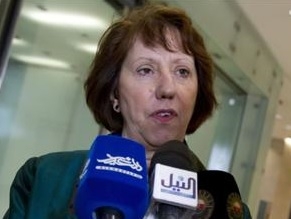|
World Jewish News

EU foreign policy chief Catherine Ashton briefs the 27 EU Foreign Ministers in Luxembourg about her Mideast tour last week.
|
EU Foreign Ministers discuss EU’s role in US-backed Mideast peace initiative
24.06.2013, Israel and the World EU Foreign Ministers from the 27 EU member states convened Monday in Luxembourg to discuss the latest developments in the Middle East Peace Process, amid US Secretary of State’s continued emphasis of resuscitating stalled Israeli-Palestinian negotiations.
In the immediate aftermath of EU foreign policy chief Catherine Ashton’s tour of the region last week, which saw reports emerge in the Israeli media of Israeli Premier Benjamin Netanyahu calling on her to block an anticipated critical statement on Israeli settlement activity, the British and French Foreign Ministries, alleged to back the proposed resolution, issued statements confirming only that talks would “focus on how the EU can support and contribute actively” to new initiatives aimed at securing a two state solution.
At the conclusion of her five-day tour, Ashton, similarly evaded comment on the settlement issue, as she delivered a message of staunch support for Kerry’s work on the ground, which has seen him making numerous visits to the region in recent months, insisting: “I said this in Ramallah last night, I say it here in Jerusalem: we want this to be the way forward, to bring direct negotiations, and Europe will support this wholeheartedly.”
Netanyahu praised Kerry’s recent diplomatic efforts as “the right thing to do”. “Israel is ready to resume these talks without preconditions today, yesterday and tomorrow. I hope that President Abbas will do the same, and I hope that Europe will support this effort because it's the right thing to do,” he added.
The EU has consistently focused its hardline statements against the Israeli settlements, issuing two staunch condemnations of the activity last May and December, in what is widely seen as a prelude to seemingly inevitable action on the labelling of settlement produces. At a Brussels press briefing earlier this month, Israel’s envoy to the EU David Walzer delivered a ringing indictment of Europe’s preoccupation with Israeli settlement policy, as he insisted the EU “could be much more influential, much more important in the peace process if they chose to look at other issues as well and not focus their attention” on settlements.
Monday's ministerial meeting is also due to focus its discussions substantially on the ongoing Syrian crisis, following this month’s G8 summit in London and its previous resolution not to renew its arms embargo along with other sanctions, thought to be a measure intended at placating Britain and France, and paving the way for individual member states to move towards arming opposition forces.
The US is similarly thought to be considering such action depending on developments in the civil war=torn country.
Following the Foreign Affairs Council meeting, Ashton is due to report the ministers’ collective conclusions to a sitting of the European Parliament foreign affairs committee in Brussels on Wednesday, ahead of a Europen Summit later this week.
by: Shari Ryness
EJP
|
|
